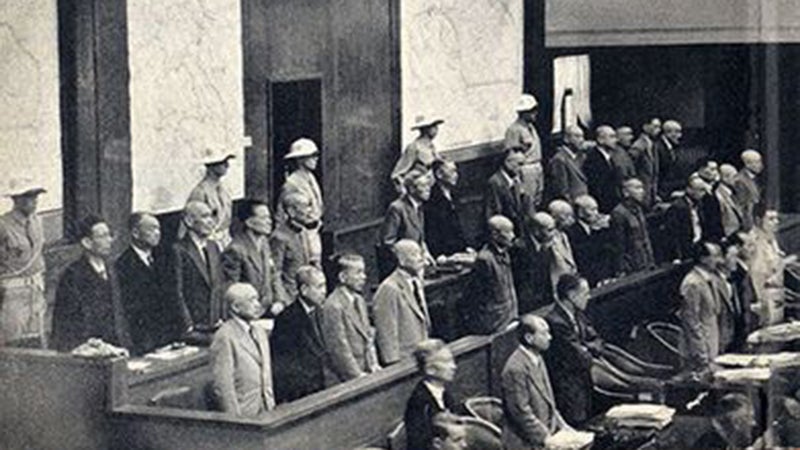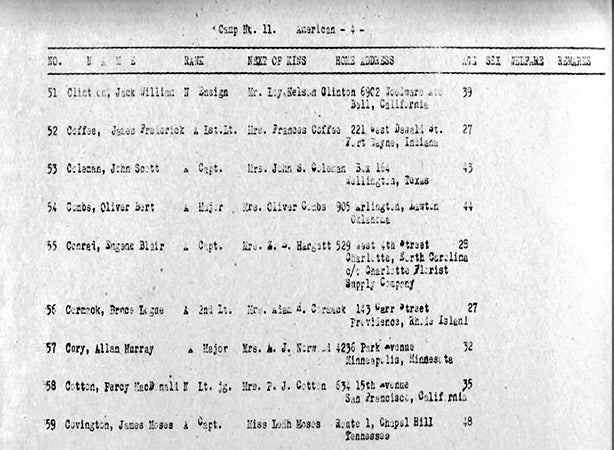Allan M. Cory, Colonel, U.S. Army, WWII Japanese Prisoner of War – Part 2
Published 2:30 pm Friday, December 9, 2022

- War Crimes Tribunal in Session, Yokohama, Japan, 1946. [Photo: Wikipedia]
|
Getting your Trinity Audio player ready...
|
Lt. Col. Allan Murray Cory had survived The Bataan Death March and two Japanese prison camps when he was taken to Japan. On November 7, 1942, Cory was among the 1,500 American POWs who were put aboard the Hell ship, Nagata Maru, at Manila, Philippines, for transfer to Japan. They arrived at Osaka on November 25, and were transferred to the Mitsushima prison camp the next day. That camp was one of the most brutal in Japan.

Roster of Allied POWS, Osaka POW camp #11, Rokuroshi, Sep. 1945. Note #57, Major Allan Murray Cory. [Photo: http://www.mansell.com/pow]
After returning to the States, Lt. Col. Allan M. Cory married Martha Virginia Baker on August 13, 1946, in Dothan, Alabama. Miss Baker was the daughter of Dr. and Mrs. S. M. Baker of Dothan, Alabama. Dr. Baker performed the ceremony at Foster Street Methodist Church, where he was the pastor. Of special note, Dr. Baker was the pastor at First Methodist Church in Andalusia, Alabama, from 1947-1953.
After a brief trip to California, Lt. Col. Cory was recalled to Japan to give testimony at the War Crimes Tribunal at Yokohama, Japan. Cory testified at the trial of Tatsuo Tsuchiya [known by the prisoners as “Little Glass Eye”].
Tatsuo Tsuchiya was a small, one-eyed Japanese prison guard who was charged with the beating death of an American prisoner of war, PFC Robert Teas of Streator, Illinois. Teas was a survivor of the Bataan Death March and was imprisoned at the notorious Mitsushima prison camp. Tsuchiya was the first of more than 300 “minor” war criminals to be tried before the war crimes tribunal.
Royal Air Force [RAF[ Squadron Leader David Grant gave a deposition at the trial. He was the senior RAF officer at the camp. In the deposition, he said, “I discussed the matter with senior American officer, Major Allan M. Cory. We concluded that the Teas story was true.”
In another deposition, PFC Charles B. Gavord of Deming, New Mexico, testified, “Little Glass Eye took Teas into the open yard, threw water on him [the temperatures were very cold in March] and beat him with hardwood canes shaped like swords.”
First Sgt. Clifton O. Snodgrass testified in another deposition, “They took a rope about an inch thick, which they doubled several times, and beat Teas around the face and head…each time Teas fell down, they made him get up again. When he was too weak to stand up, they picked him up and continued beating him for up to 30 minutes.” Teas died on March 5, 1943.
Tatsuo Tsuchiya, or Little Glass Eye, was convicted of the beating death of PFC Teas and sentenced to life imprisonment. He was acquitted of charges related to beating Lt. Col. Allan M. Murray and stealing Red Cross supplies.
At the War Crimes Tribunal in Yokohama, nine guards from that camp were sentenced to death and executed. Cory’s testimony at the trial was instrumental in the prosecution of several of the war criminals.
After returning from Japan, Cory was promoted to Colonel and was assigned to Fort Benning, Georgia. The Cory family served tours in Puerto Rico; Greece; Amarillo, Texas; Washington, D.C.; and Montgomery, Alabama. Colonel Cory served one tour in Vietnam while his family lived in Montgomery. Prior to his retirement, Colonel Cory served as the senior Army advisor to the Alabama National Guard in Montgomery.
Colonel Allan M. Cory, Sr. died in December 1975 at the age of 62. Funeral services and burial were held at the Fort Benning National Cemetery in Georgia. Survivors included his wife, Mrs. Martha Baker Cory; a daughter Mrs. Anne Alden Godfrey; a son, Allan Murray Cory, Jr.; and two grandchildren.
Mr. and Mrs. Allan Murray Cory, Jr. currently reside in Andalusia, Alabama.
John Vick
[Sources: The Montgomery Journal article Sep. 17, 1968 by Camille Wallace; The Dothan Eagle article Aug. 21, 1946; The San Antonio Light article Dec. 21, 1946; and www.mansell.co/pow.
Roger Mansell of Palo Alto, California, founded the Center for Research, Allied POWs Under the Japanese. His years of research are recorded in files that may be searched online. Anyone doing research on POWs held by the Japanese during WW II owes Mr. Mansell a debt of gratitude. He died at Palo Alto in 2010].
Cory kept a diary during his imprisonment and its contents were also used at the war crimes trials. The diary’s existence or location is unknown at this time.




